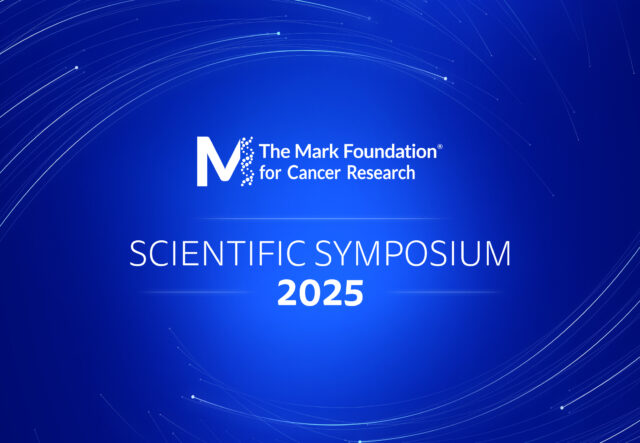Scientists from 13 states and seven countries gathered in New York City in April 2025 for the Mark Foundation’s fifth Scientific Symposium. The event provided a critical forum for the Foundation’s grantees to share their research, foster new collaborations, and build robust partnerships within a global network dedicated to accelerating breakthroughs in cancer research.
The program included talks by ten Mark Foundation-funded investigators, who shared groundbreaking discoveries in areas ranging from the use of circulating tumor DNA to monitor cancer evolution to how obesity impacts responses to cancer immunotherapy. Regina Barzilay, PhD, the School of Engineering Distinguished Professor for AI and Health at MIT, delivered a keynote address on the transformative potential of artificial intelligence in cancer medicine. James Bradner, MD, Executive Vice President, Research and Development at Amgen, joined Ross Levine, MD, Senior Vice President, Translational Research at Memorial Sloan Kettering and Chair, Mark Foundation Scientific Advisory Committee, for a fireside chat.
“The caliber of research presented by our grantees at the Symposium underscores the rapid progress being made in cancer research,” said Levine. “These findings are not just promising; they’re actively shaping the future of cancer treatment and diagnosis.”
In the Symposium’s opening remarks, Mark Foundation CEO Ryan Schoenfeld, PhD, pointed to the critical role that foundations play in the cancer research funding landscape and called for increased cooperation between organizations around the world to amplify their impact. Schoenfeld also announced significant new initiatives at the Symposium, including the launch of The Mark Foundation Center for Lineage Plasticity and the latest cohort of Endeavor Award recipients.
“This Symposium exemplifies our commitment to fostering an inspired, collaborative ecosystem that empowers scientists to push the boundaries of cancer research,” said Ryan Schoenfeld, PhD, CEO of The Mark Foundation for Cancer Research. “By facilitating knowledge exchange and strategic partnerships, we’re driving the kind of innovation that ultimately translates to meaningful benefits for patients worldwide.”




